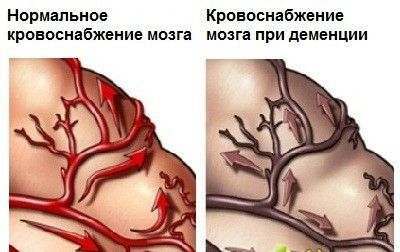Alcoholic dementia
Contents:
- What is dementia in alcoholism?
- How does alcoholic dementia flow?
- Treatment of alcoholic dementia
- Prognosis and consequences of the disease
Dementia is a serious disease of the central nervous system, leading to irreversible memory loss. Dementia on the background of alcoholism ends with a total change in the personality of the person and his intellect.

What is dementia in alcoholism?
The term implies a variety of clinical manifestations of dementia, developing against the background of a prolonged toxic effect of alcohol on the brain. Men who are older than 45-55 years in the post-Soviet countries, Finland and Asia suffer more often. Dementia on the background of alcoholism is not different from that for another reason of defeat, and is characterized by a change in thinking, memory, speech and the ability to navigate the surrounding world, the emergence of alcoholic encephalopathy.
Dementia is a common cause of disability in the elderly with a complete loss of self-care ability. The disease has a pronounced effect on the social life of the patient and his family. Alcoholic dementia can develop not only in the last stage of alcoholism, but also with prolonged "everyday" drinking.
How does alcoholic dementia flow?
For the diagnosis, a vivid clinical picture of the disease and additional diagnostics are needed, despite the fact that dementia and alcohol are related concepts. Symptoms of dementia have a clear staging of their occurrence.
At an early stage, changes are poorly expressed, and are often rarely disturbed by the patient himself or his immediate family. Among all the signs, infantility( childish character traits) prevails - a person is not able to make his own decision and defend his point of view. Signs grow slowly. Sometimes such a personality change is taken as a "middle age crisis" or chronic fatigue, due to which valuable time is lost for the beginning of treatment. This lack of awareness of the population leads to an increase in the frequency of severe forms of alcoholic dementia. 
In the stage of moderate severity of human dementia, emotional lability, disorientation in space and time, difficulties in communicating with surrounding people, changes in behavior, and memory failures start to worry. In some cases, the patient already at this stage needs outside help in caring for himself.
The inability to perceive new information, change in the volitional sphere of a person's life are characteristic symptoms of the transition to a severe stage of the course of dementia. Characteristic passivity and dependence on another person, unrecognizability of relatives, amnesia on names, gliosis changes in the brain are all manifestations of the late stage of the disease.
In addition to signs of brain tissue damage, in some cases joint damage and pathological changes of peripheral nerves and muscles are manifested.
Treatment of alcoholic dementia
The only chance for a successful prognosis for this disease is the timely treatment started in the first stage of the symptomatology.
Important! Drug treatment for alcoholic dementia has not been developed to date.
Improvement in the quality of life of the patient and his family is possible in a number of tasks:
1. increasing the physical activity of the patient;
2. early detection of dementia;
3. treatment of concomitant diseases;
4. normalization of the diet;
5. refusal of alcoholic beverages;
6. Creation of comfortable conditions for the patient.
Treatment of other diseases plays a great role. Diabetes mellitus, hypertensive disease are risk factors for accelerating degradation processes in alcoholic dementia. 
From the drugs of supportive drug therapy, doctors allocate:
• nootropic substances, Pentoxifylline, Adaptol;
• remedy Cerebrolysin;
• antioxidants( tocopherol, vitamin C).
Forecast and Consequences of Disease
Often lesions of nervous tissue have an irreversible process, leading to gross changes in the person's social and everyday life. Properly performed care can slow its progression, but do not change the course of the course of the disease.
The absence of treatment for dementia is fraught with a reduction in the length of a person's life, the inability to act independently and completely dependent on the help of others. Disability with dementia on the background of alcoholism is not an exception, but a rule.
Finally, it should be said that lack of awareness of people about the effects of alcohol on the brain leads to the appearance of obstacles to the diagnosis of the disease and its treatment. Dementia and alcohol are often related things, and require explanations for a wide audience of people.
write the question in the form below:



